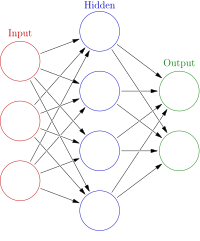
Photo from wikipedia
In automatic parking motion planning, multi-objective optimization including safety, comfort, parking efficiency, and final parking performance should be considered. Most of the current research relies on the parking data from… Click to show full abstract
In automatic parking motion planning, multi-objective optimization including safety, comfort, parking efficiency, and final parking performance should be considered. Most of the current research relies on the parking data from expert drivers or prior knowledge of humans. However, it is challenging to obtain a large amount of high-quality expert drivers’ data. Furthermore, expert drivers’ data or prior knowledge of humans does not guarantee an optimal multi-objective parking performance. In this article, we propose a model-based reinforcement learning method that learns parking policy of the data, by executing the data generation, data evaluation, and training network, iteratively. The trained network is used to guide the data generation cycle in the subsequent iteration. Based on this proposed method, we can get rid of human experience largely and learn parking strategies autonomously and quickly. The learned strategies ensure the multi-objective optimality of above requirements in the parking process. First, an environment model that approximates the actual environment is established, and the learning efficiency is accelerated through the simulated interaction between the agent and the environment model. To make the system independent of expert data or prior knowledge, a data generation algorithm combining Monte Carlo Tree Search (MCTS) and longitudinal and lateral policies is proposed. Then, to meet the multi-objective optimal demands mentioned above, a reward function is constructed to evaluate and filter the parking data. Finally, a neural network is used to learn the parking strategy from the filtered data. From the real vehicle test benchmarked with a mass-produced parking system, the proposed method is found to achieve better parking efficiency and lower requirements for start parking posture, thereby verifying the algorithm’s superiority.
Journal Title: IEEE Access
Year Published: 2020
Link to full text (if available)
Share on Social Media: Sign Up to like & get
recommendations!